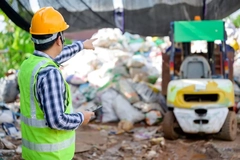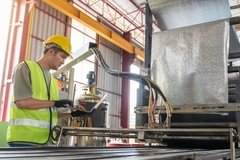Earth Day 2023: Global collaboration crucial to realizing plastics, bio- and fiber-based circularity

21 Apr 2023 --- Tomorrow marks Earth Day 2023, an annual global event in which over one billion people and industry stakeholders engage through various environmental sustainability projects to promote awareness and spur climate action initiatives. Packaging brands across the supply chain are using the day to stress the importance of improving circularity in petrochemical, bio- and fiber-based innovation.
First held in 1975, Earth Day provides an opportunity for producers and brands to showcase their latest footprint reduction moves, product and system redesigns and policy perspectives.
Since its inception 50 years ago, Earth Day has created civically oriented programs with partners inside and outside the environmental movement. It seeks to mobilize global individuals on issues from voter registration to environmental education.
“Our world needs transformational change. It’s time for the world to hold sectors accountable for their role in our environmental crisis while also calling for bold, creative, and innovative solutions. This will require action at all levels, from business and investment to city and national government,” states the organization.
“As an individual, you yield real power and influence as a consumer, a voter and a member of a community that can unite for change.”
PackagingInsights talks to some of the packaging industry’s biggest players, including Tetra Pak, Dow and Danimer Scientific, about their actions and policy demands ahead of Earth Day.
Plastics circularity
Innova Market Insights pegged “Plastics Circularization” as a top trend for 2023. The global market researcher found that despite the plastic pollution crisis and poor recycling rates, 72% of global consumers still believe plastic has average or above recyclability relative to other materials. Moreover, half (52%) say they would pay more for a product if it came in recyclable packaging.
 Global partnerships are essential in circularizing different material economies, say packaging stakeholders.“In an effort to improve plastic circularity, we’re noticing an increasing shift toward monomaterial films using LDPE and PP, for which recycling infrastructure already exists,” says Akhil Eashwar Aiyar, projects leader at Innova Market Insights.
Global partnerships are essential in circularizing different material economies, say packaging stakeholders.“In an effort to improve plastic circularity, we’re noticing an increasing shift toward monomaterial films using LDPE and PP, for which recycling infrastructure already exists,” says Akhil Eashwar Aiyar, projects leader at Innova Market Insights.
Haley Lowry, global sustainability officer at Dow Packaging & Specialty Plastics, highlights advances in the flexible plastics sector, where an increasing number of consumer goods companies are pledging lower carbon footprints.
“These pledges affect a large portion of the plastic products people use or encounter in everyday life, including packaging materials such as bottles, caps, meal trays and flexible film wrap,” she says.
“As a result, the demand for circular polymers is rapidly increasing and Dow is working to meet that demand with as little carbon emissions as possible. We’re also finding ways to use new materials – like bio-based materials and recycled feedstocks – to reduce the carbon footprint of products by reducing the amount of fossil fuels used in making them.”
Biopolymer boom
The trend toward bio-based solutions has been highlighted by other emerging companies like Danimer Scientific, which produces bioplastics and bio-based fuel in the US.
Company CEO Stephen Croskrey rang the closing bell at the New York Stock Exchange (NYSE) on Monday to mark the beginning of Earth Week. Collaborations to boost collection and recycling rates in Asian markets can change the status quo, according to Tetra Pak.
Collaborations to boost collection and recycling rates in Asian markets can change the status quo, according to Tetra Pak.
US President Joe Biden recently announced that his administration is setting a goal to replace 90% of plastics with biomaterials within the next 20 years. According to recent research, bio-based processes could generate US$4 trillion in annual US economic impact over the next 10 to 20 years.
“We were privileged to ring the closing bell at the NYSE, both in honor of Earth Week and to celebrate Danimer’s accomplishments as a company that makes environmental responsibility our highest priority,” Croskrey says.
“As interest continues to grow in alternatives to conventional petroleum-based plastics, we envision a bright future ahead for our sustainably sourced bioplastics, which have a wide variety of practical food-contact applications and are 100% compostable, helping to meaningfully combat the plastic waste crisis.”
Accelerating fiber-based circularity
Meanwhile, Christine Levêque, vice president of collection and recycling at Tetra Pak, highlights the strides made in fiber-based materials for its carton packaging. She tells us that greater international collaboration, particularly in East Asia, can broaden the globe’s ability to achieve circular economy systems.
The company recently began providing technical and financial support to Luhai Pro-environment, a long-standing waste management partner in China.
 US President Biden recently announced his administration aims to cut 90% of plastics with biomaterials by 2030. (Image credit: The White House Photo Office Instagram)A new “first-of-its-kind automatic sorting center” was established and has started operation in Xiamen, China, creating a new collection model for the country’s low-value recyclables waste stream to supplement the current beverage carton collection network.
US President Biden recently announced his administration aims to cut 90% of plastics with biomaterials by 2030. (Image credit: The White House Photo Office Instagram)A new “first-of-its-kind automatic sorting center” was established and has started operation in Xiamen, China, creating a new collection model for the country’s low-value recyclables waste stream to supplement the current beverage carton collection network.
“The project offers a blueprint for other locations seeking to establish their collection systems,” says Levêque. “In China, regulation ensures that beverage cartons are categorized into recyclable waste. The main challenge, therefore, lies in improving the collection and sorting.”
“We use a customized approach to improve recycling and match regional needs, as each country has different needs and different levels of maturity. The red thread is one through collaborative innovation and a clear drive to change the status quo,” she asserts.
Global collaboration, advancing recycling
Levêque emphasizes that intercontinental collaborations, such as with China, are key to preventing waste and establishing effective recycling streams.
“We estimate that, globally, 1.2 million tons of beverage cartons have been collected and sent for recycling in 2021. But, regardless of the figures, we know that the picture is very fragmented across the globe and we want to go further,” she says.
“To accelerate circularity and to make recycling more effective, we need collective action and a multi-pronged approach – from the industry, the recycling value chain, governments, consumers and civil society.”
In the EU, Levêque says the recent EU proposal for a Packaging and Packaging Waste Regulation (PPWR) is a positive start to reducing packaging waste and making all packaging recyclable or reusable by 2030 in the EU.
However, she asserts that legal certainty and timely adoption of the several delegated acts related to the PPWR are crucial. “It is an opportunity for the whole packaging industry to foster the development of sustainable and innovative solutions when based on a thorough assessment of the impact on food safety and availability, food waste and environment.”
“When it comes to advanced recycling, we believe that each actor has a critical role to play. It is the role of policymakers to put legislation in place to set the ground rules for waste reduction, that of local authorities and industry to establish collection systems jointly and that of the industry to ensure recycling solutions,” Levêque continues.
“Only consumers can separate and sort waste at the source and only producers can put recyclable packaging onto the market.”
By Louis Gore-Langton










